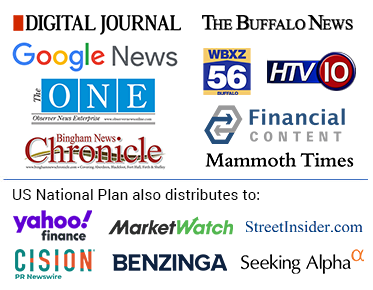6 Big Press Release Headline Mistakes (and best practices to fix them)
Industry: Press Release Tips
(PRUnderground) May 12th, 2014
 The most important part of your press release on PRUnderground.com is the headline. Do NOT take this lightly. If your headline doesn’t work, then that poignant quote from your CEO in paragraph 3 or even that big announcement in the first sentence do not matter – because they are much less likely to get read. Readers (and search engines) have limited attention spans. Very limited. If you do not grab their attention with your headline, your press release will not get the visibility you seek.
The most important part of your press release on PRUnderground.com is the headline. Do NOT take this lightly. If your headline doesn’t work, then that poignant quote from your CEO in paragraph 3 or even that big announcement in the first sentence do not matter – because they are much less likely to get read. Readers (and search engines) have limited attention spans. Very limited. If you do not grab their attention with your headline, your press release will not get the visibility you seek.
We want you to get maximum exposure for your press release, so we put together a list of the 6 biggest press release headline mistakes (and best practices to fix them).
Mistake # 1) No Keywords in Headline- You did not include relevant keyword phrases in your headline. The (little known) incredible power of Google News is that it takes keywords from the first 65 characters of your headline, and it then shows your press release when people search for these keyword phrases in Google News, AND oftentimes in Google web search results. You may have noticed when you search for something in Google that one section of the first page of results is dedicated to recent news on those search keywords. [See example]
If you have included important keyword phrases in your headline, you have a chance to instantly jump in front of hundreds of millions of search results and be on the first page of Google results. (Note that it is very hard to rank for a single keyword, so think of a relevant 3 word string of words)
Examples:
BAD: “Acme Corporation announces new product line for fall 2014”: For this one your release might show up in Google for your company name, but there are no other specific keywords in this headline that people might be searching for that could lead to your press release. It’s just too general.
Good: “Boston Startup Acme to launch Solar Smartphone at XYZ Tech Conference”: Ok so now you have something more specific for search engines to grab on to. First it may show up for search terms like “Solar Smartphone” or “XYZ Tech Conference” or even “Boston Startup” or “Smartphone Startup”. These are some juicy relevant keywords for your business that your release may start showing for in Google search results!
[Read some Case Studies of companies that had successful headlines with search engines.]
Mistake #2) Too Long- Your headline is too long. Google only shows and indexes the first ~65 characters of your headline, so ideally you keep it within this length. If you do go up to 100 characters, be sure your most important keywords are in the first 65 characters. Readers also tune out quickly with lengthy headlines, so use your best wordsmithing skills and nail those first 65 characters.
Mistake #3) Boring- Your headline does not grab a reader’s attention. Don’t assume that a person will keep reading to get to the interesting part of your announcement in paragraph 2 (or even the first paragraph). Get their attention right away. Think about it as if you have 10 words to get someone’s interest. If you were pitching your announcement to a writer at the New York Times (or even a friend) and only had 10 words to do so, what would they be? This should be close to your headline.
BAD: “T-rex Inc announces new theme park for kids”: This headline has nothing for readers to get excited about. What kind of theme park? Is it near me or across the world? I don’t have time for this…next story.
Good: “Life-size Dinosaur theme park for kids to open in Central Park from Trex Inc”. Ok so with this press release we know more about it. It’s about dinosaurs, it’s in Central Park, it’s for kids, and the dinosaurs are life-size. Interesting enough to read more about it.
Mistake #4) ALL CAPS– You wrote your headline in all caps. Yes it is true to that people traditionally capitalized every letter of the press release headline. But in the online world, all-caps is frowned upon and may even get your release blocked from Google News. You can capitalize the first letter of words, but do not capitalize every letter in the headline.
Mistake #5) Unknown Sender– You did not include your company name or spokesperson or product in the headline. To comply with most press release requirements, the issuing company name or product or spokesperson must be in the headline. This distinguishes it from a regular news article. Don’t necessarily put your full legal company name in the headline (Ex. “ZZZ Enterprises Incorporated) as that takes up valuable keyword real estate, but have a name in there.
BAD: “New book analyzes reality TV in Japan”: It just sounds like a an article or a review and may not be picked up a as press release.
Good: “Real Tokyo, a new book by John Yoshida analyzes reality TV in Japan”: Not only does it identify the issuer of the release, but it also adds some good keywords into the title.
Mistake #6) No Location- For locally-based releases you did not include the location. Remember, your release is going be found all over the web, so if your announcement is location based (ex. an event in London, a spa in Los Angeles, a concert in Sydney) it is wise to include the city in the headline to show up in both local search results and also catch local reader’s interest.
BAD: “Fifth Annual ‘End to Cancer’ Charity Gala Event Set for Fall 2014”. Where is it?
Good: “Fifth Annual ‘End to Cancer’ Charity Gala in Dallas Set for Fall 2014”. Because it is a local event (Dallas, Texas), your likelihood of getting a local reader or editor’s attention will go way up with the city in the headline.
Fix these 6 mistakes and your are going to see a lot more views for your press releases.
Next week we will look at common mistakes in the body of your press release, and best practices to make them better.

